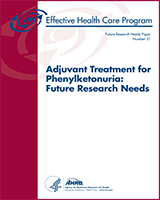NCBI Bookshelf. A service of the National Library of Medicine, National Institutes of Health.
McPheeters ML, Lindegren ML, Sathe N, et al. Adjuvant Treatment for Phenylketonuria: Future Research Needs: Identification of Future Research Needs From Comparative Effectiveness Review No. 56 [Internet]. Rockville (MD): Agency for Healthcare Research and Quality (US); 2012 Sep. (Future Research Needs Papers, No. 21.)

Adjuvant Treatment for Phenylketonuria: Future Research Needs: Identification of Future Research Needs From Comparative Effectiveness Review No. 56 [Internet].
Show detailsThe existing research gaps related to the use of adjunct pharmacologic therapy in PKU are both substantive and methodologic. Specific deficiencies range from the substantive need for more trials that include more individuals to methodologic gaps in our understanding of the longer term implications of intermediate outcomes. In both cases, research is fundamentally challenging because the disease is so rare, making accrual of adequate numbers of participants difficult, if not impossible, for specific studies. Our multistep process identified high-priority methodologic needs related to measurement of outcomes and dietary control and treatment-related needs including understanding adherence to treatment and an optimal system of care for affected individuals, the effects of BH4 on pregnant women, and effects on mental health and behavioral comorbidities. While ongoing research may begin to provide some answers, addressing research needs in PKU will require further long term, rigorously designed, comparative studies. Further research also requires expanding our foundation of understanding of critical aspects of the disease including its natural history, biologic mechanisms of disease, and ways to measure elevated Phe to better understand its effects on cognition. Stakeholders also emphasized that clinical decisionmaking will, by necessity be based on a range of factors, including the rarity of the disease, the devastating consequences of not treating and the association of treatment with quality of life and family functioning. Future comparative effectiveness research should include additional contextual data to support decisionmaking and increase its utility.
- Conclusions - Adjuvant Treatment for Phenylketonuria: Future Research NeedsConclusions - Adjuvant Treatment for Phenylketonuria: Future Research Needs
Your browsing activity is empty.
Activity recording is turned off.
See more...